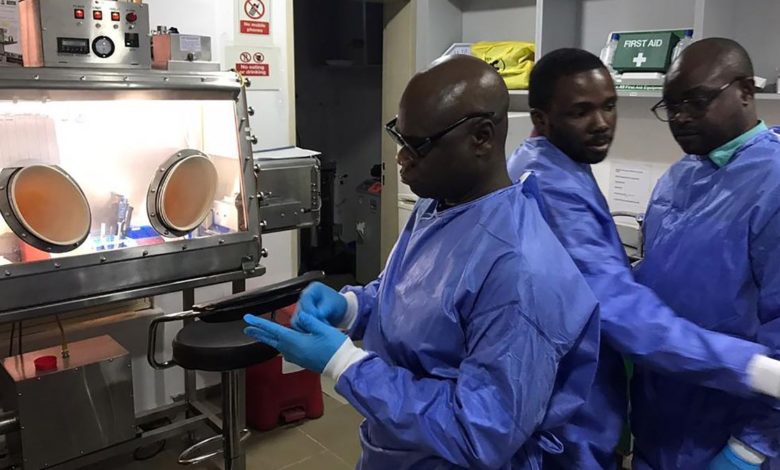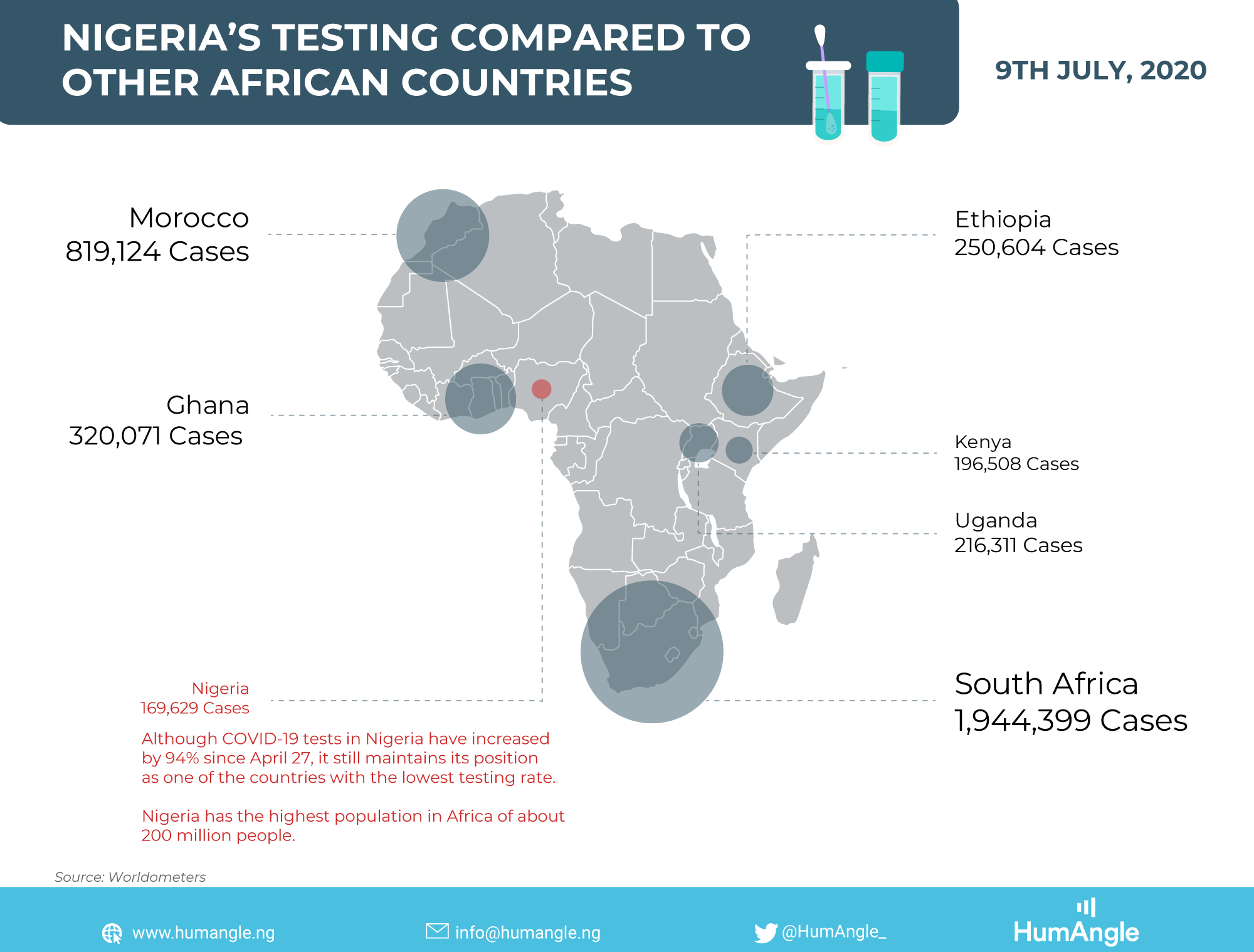Analysis: Nigeria’s COVID-19 Testing Increases By 94% From April, Still Among Lowest In Africa

COVID-19 tests in Nigeria have increased by 94 per cent since April 27, this means that as at July 9, the country has conducted 169, 629 tests.
The figure is 159, 629 higher than the 10, 000 tests Nigeria carried out in April. However, the country is still among those with the lowest number of tests in Africa.
HumAngle reported in April that Nigerians had expressed apprehension over the low testing rate despite the almost four-week total lockdown period.
They also said that the lockdown period was not been properly utilised by the government to find those infected with the novel coronavirus.
By April 26, Nigeria had recorded 1, 273 confirmed cases which increased to 30, 249 on Wednesday, July 8, 2020.
Cases have exponentially risen as the testing rate increased. Nigeria moved from testing only 53 people per one million population to about 823 per one million by July. The increase is attributed to laboratories in the country getting involved in testing.
On May 7, the Minister of Health, Dr Osagie Ehanire, said 21 laboratories were operational nationwide for COVID-19 testing as efforts were made to meet the demands of the populace. The number is three times the number that was initially conducting the test in April.
During the crisis over mysterious deaths in Kano State in Nigeria’s Northwest in May, the minister said: “The laboratories in Kano were directed to work in shifts, to reduce the turnaround time for testing.
“The Ministry of Health’s Task Team to Kano is collaborating intimately and fully engaged in remediation activities, strongly emphasising training and capacity building for all personnel in order to help rebuild manpower in state and federal health facilities.
“This includes non-medical personnel such as cleaners, porters and security guards, especially in the COVID-19 isolation and treatment centres.”
Still not enough tests
Compared to other African countries, Nigeria does not have enough testing capacity in relation to its population. This has given room for lots of cases going undetected.
South Africa has carried out the most tests so far with 32, 777 per one million persons. Altogether, 1, 944, 399 tests have been done out of which 224, 665 are confirmed COVID-19 cases.
Ghana has fewer confirmed cases than Nigeria with 22, 822 but it has tested 10, 298 people per one million population. In total, the country has conducted 320, 071 tests which is 47 per cent higher than Nigeria’s figure.
Ethiopia has done 250, 604 tests, which accounts for 2, 179 people per one million population. Uganda has carried out 216, 311 tests, which means 4, 728 people per one million population have been tested and the country has recorded 977 COVID-19 cases.
Kenya has carried out about 196, 508 tests or 3, 653 people per one million population and 8, 528 confirmed cases have been recorded. And in Morocco, 819, 124 tests have been done accounting for 22, 187 people per one million and 14, 771 cases confirmed.
As at April 27, Uganda had tested 20,329 people, which was 444 people per one million population.
At the same time, Ethiopia had conducted over 13,645 tests and Kenya, 17, 992. South Africa led the pack with 168,643 tests.; Morocco, 27,399 tests; Egypt, 90, 000 tests and Ghana, 100,622 tests.
COVID-19 deaths will increase in Nigeria – Minister
Ehanire, on June 18, warned that the number of COVID-19 fatalities would increase as the number of confirmed cases increased.
“We have said that the increasing number of cases should be a warning that fatalities will increase too but there are measures we can take to limit case fatality rate.
“Since the majority of fatalities are over 50 years of age, or have pre-existing ailments like diabetes, cancer, hypertension, kidney disease, HIV, etc, this group of citizens has to be specially protected.
“This protection begins with limiting their exposure to risks of COVID-19 infection by urging them to stay at home, except there is an urgent and dire need to go out,” the minister said.
Ehanire urged that face masks be worn at any time once a person was outside the house or when inside the house with persons who might have been exposed.
He further advised that citizens“observe all other non-pharmaceutical advisories, like frequent hand washing, social distancing, respiratory hygiene, sanitiser use, etc.”
“I must emphasise that going to places where there can be a crowd, like a market or also places of worship, carries the risk of increased exposure.
“l also stress that being in a closed room increases the risk of exposure to infection in proportion to the number of people and the length of time spent with them because the likelihood of the presence of a positive person increases with the number and infection with the time of exposure,” the minister said.
Nigerians asked to prepare for the worst
On Thursday, July 2, Ehanire called on states to prepare for the worst in terms of the impact of the COVID-19 pandemic. He spoke at the Presidential Task Force (PTF) on COVID-19 briefing in Abuja.
According to him, as the country begins another phase of the eased lockdown, it is important for the health sector to review the current guidelines in order to assess its effectiveness in containing the spread of the virus.
“This rising trend requires that each state of the federation continues to prepare, as we all want to prepare, for the worst as we hope for the best and work for the best,” the minister said.
“We need to prepare more bed spaces and increase sample collection sites as well as improve logistics to deliver to designated laboratories promptly for testing.
“The COVID-19 statistics, as he (Boss Mustapha, Secretary to Government of the Federations) said are expected to rise further with improved testing but also as a sign of COVID-19 is actually expanding faster than our systems are handling it.”
Ehanire added that all countries of the world, including Nigeria, relied heavily on the cooperation of citizens, especially in implementing “simple” non-pharmaceutical measures such as the use of face masks.
“This success or lack of response is, therefore, a factor, not just of national but also of sub-national and citizen efforts, hence the need to again call on all states, local government areas, wards, communities to know that they have a critical role to play and that their engagement matters,” he said.
According to the Nigeria Centre for Disease Control, as of July 8, 2020, a total of 30,249 confirmed COVID-19 cases have been recorded in the country out of which 12,373 persons have recovered, while 684 patients have died.
Support Our Journalism
There are millions of ordinary people affected by conflict in Africa whose stories are missing in the mainstream media. HumAngle is determined to tell those challenging and under-reported stories, hoping that the people impacted by these conflicts will find the safety and security they deserve.
To ensure that we continue to provide public service coverage, we have a small favour to ask you. We want you to be part of our journalistic endeavour by contributing a token to us.
Your donation will further promote a robust, free, and independent media.
Donate HereStay Closer To The Stories That Matter





